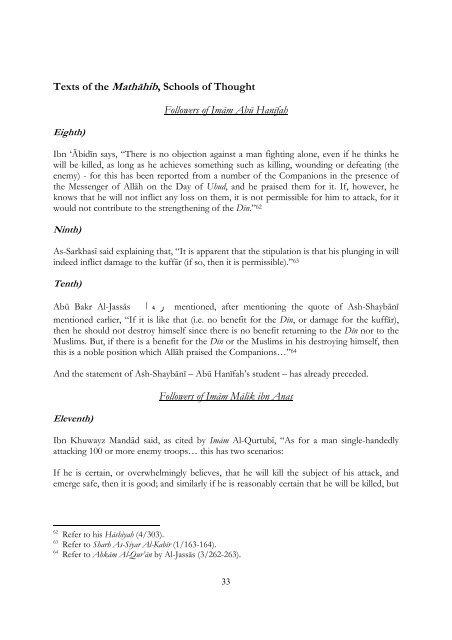the-islamic-ruling-on-the-permissibility-of-self-sacrificial-operations-suicide-or-martyrdom
the-islamic-ruling-on-the-permissibility-of-self-sacrificial-operations-suicide-or-martyrdom
the-islamic-ruling-on-the-permissibility-of-self-sacrificial-operations-suicide-or-martyrdom
Create successful ePaper yourself
Turn your PDF publications into a flip-book with our unique Google optimized e-Paper software.
Texts <strong>of</strong> <str<strong>on</strong>g>the</str<strong>on</strong>g> Mathāhib, Schools <strong>of</strong> Thought<br />
Eighth)<br />
Followers <strong>of</strong> Imām Abū Hanīfah<br />
Ibn ‘Ābidīn says, “There is no objecti<strong>on</strong> against a man fighting al<strong>on</strong>e, even if he thinks he<br />
will be killed, as l<strong>on</strong>g as he achieves something such as killing, wounding <strong>or</strong> defeating (<str<strong>on</strong>g>the</str<strong>on</strong>g><br />
enemy) - f<strong>or</strong> this has been rep<strong>or</strong>ted from a number <strong>of</strong> <str<strong>on</strong>g>the</str<strong>on</strong>g> Compani<strong>on</strong>s in <str<strong>on</strong>g>the</str<strong>on</strong>g> presence <strong>of</strong><br />
<str<strong>on</strong>g>the</str<strong>on</strong>g> Messenger <strong>of</strong> Allāh <strong>on</strong> <str<strong>on</strong>g>the</str<strong>on</strong>g> Day <strong>of</strong> Uhud, and he praised <str<strong>on</strong>g>the</str<strong>on</strong>g>m f<strong>or</strong> it. If, however, he<br />
knows that he will not inflict any loss <strong>on</strong> <str<strong>on</strong>g>the</str<strong>on</strong>g>m, it is not permissible f<strong>or</strong> him to attack, f<strong>or</strong> it<br />
would not c<strong>on</strong>tribute to <str<strong>on</strong>g>the</str<strong>on</strong>g> streng<str<strong>on</strong>g>the</str<strong>on</strong>g>ning <strong>of</strong> <str<strong>on</strong>g>the</str<strong>on</strong>g> Dīn.” 62<br />
Ninth)<br />
As-Sarkhasī said explaining that, “It is apparent that <str<strong>on</strong>g>the</str<strong>on</strong>g> stipulati<strong>on</strong> is that his plunging in will<br />
indeed inflict damage to <str<strong>on</strong>g>the</str<strong>on</strong>g> kuffār (if so, <str<strong>on</strong>g>the</str<strong>on</strong>g>n it is permissible).” 63<br />
Tenth)<br />
Abū Bakr Al-Jassās رحمه االله menti<strong>on</strong>ed, after menti<strong>on</strong>ing <str<strong>on</strong>g>the</str<strong>on</strong>g> quote <strong>of</strong> Ash-Shaybānī<br />
menti<strong>on</strong>ed earlier, “If it is like that (i.e. no benefit f<strong>or</strong> <str<strong>on</strong>g>the</str<strong>on</strong>g> Dīn, <strong>or</strong> damage f<strong>or</strong> <str<strong>on</strong>g>the</str<strong>on</strong>g> kuffār),<br />
<str<strong>on</strong>g>the</str<strong>on</strong>g>n he should not destroy him<strong>self</strong> since <str<strong>on</strong>g>the</str<strong>on</strong>g>re is no benefit returning to <str<strong>on</strong>g>the</str<strong>on</strong>g> Dīn n<strong>or</strong> to <str<strong>on</strong>g>the</str<strong>on</strong>g><br />
Muslims. But, if <str<strong>on</strong>g>the</str<strong>on</strong>g>re is a benefit f<strong>or</strong> <str<strong>on</strong>g>the</str<strong>on</strong>g> Dīn <strong>or</strong> <str<strong>on</strong>g>the</str<strong>on</strong>g> Muslims in his destroying him<strong>self</strong>, <str<strong>on</strong>g>the</str<strong>on</strong>g>n<br />
this is a noble positi<strong>on</strong> which Allāh praised <str<strong>on</strong>g>the</str<strong>on</strong>g> Compani<strong>on</strong>s…” 64<br />
And <str<strong>on</strong>g>the</str<strong>on</strong>g> statement <strong>of</strong> Ash-Shaybānī – Abū Hanīfah’s student – has already preceded.<br />
Eleventh)<br />
Followers <strong>of</strong> Imām Mālik ibn Anas<br />
Ibn Khuwayz Mandād said, as cited by Imām Al-Qurtubī, “As f<strong>or</strong> a man single-handedly<br />
attacking 100 <strong>or</strong> m<strong>or</strong>e enemy troops… this has two scenarios:<br />
If he is certain, <strong>or</strong> overwhelmingly believes, that he will kill <str<strong>on</strong>g>the</str<strong>on</strong>g> subject <strong>of</strong> his attack, and<br />
emerge safe, <str<strong>on</strong>g>the</str<strong>on</strong>g>n it is good; and similarly if he is reas<strong>on</strong>ably certain that he will be killed, but<br />
62 Refer to his Hāshiyah (4/303).<br />
63 Refer to Sharh As-Siyar Al-Kabīr (1/163-164).<br />
64<br />
Refer to Ahkām Al-Qur’ān by Al-Jassās (3/262-263).<br />
33


